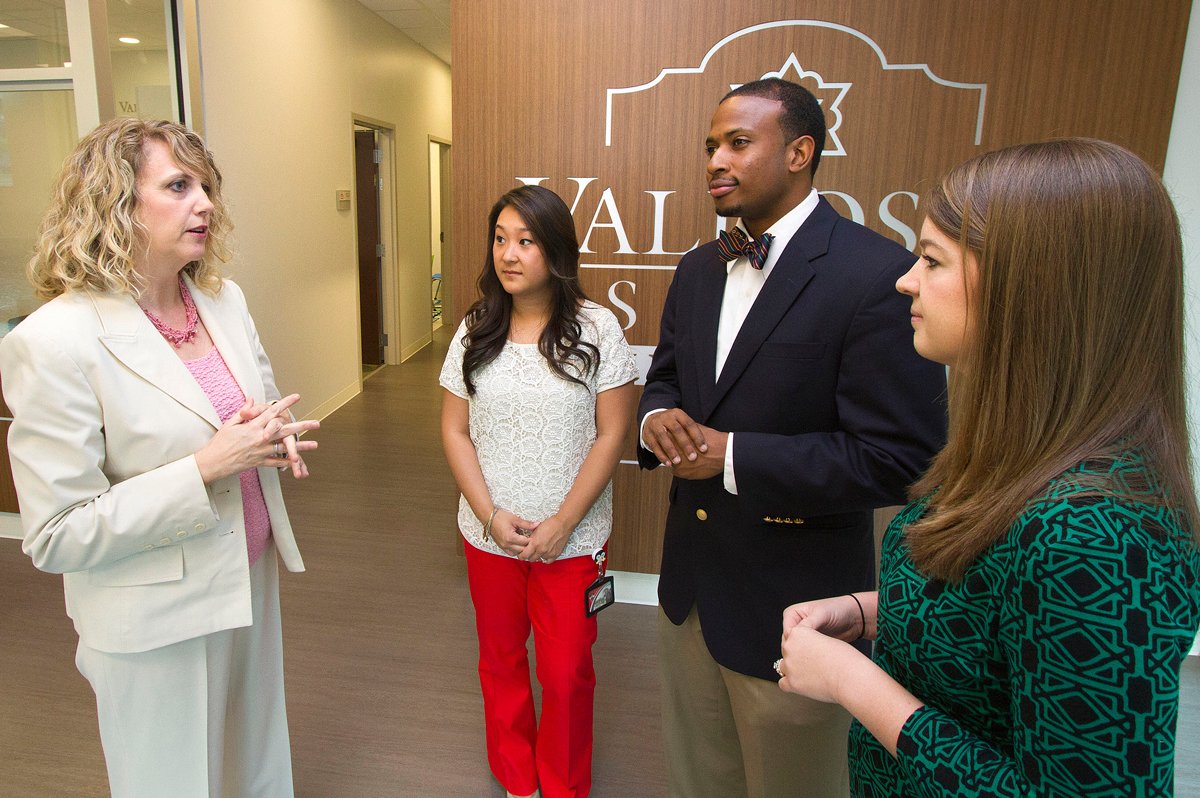BY JESSICA POPE
VALDOSTA – Valdosta State University’s Speech and Hearing Clinic will open in its new location, on the first floor of the modern, multi-million dollar Health Sciences and Business Administration (HSBA) Building, on June 16.
Founded in 1962 by the Valdosta Junior Service League and the university, the clinic offers hearing evaluations, communication and cognitive evaluations, and therapeutic services to 150-plus men, women, and children from the South Georgia community each session of VSU’s academic year, January through April, June and July, and August through November. Graduate student-clinicians provide services, working under the supervision of their Department of Communication Sciences and Disorders faculty members — who are also licensed and certified speech-language pathologists. This affords VSU’s students the opportunity to train in a real-life setting; receive invaluable feedback from their supervisors, fellow student-clinicians, and clients; and improve the quality of life of others through public service.
“This is an exciting time for our department and the VSU Speech and Hearing Clinic,” said Lorena M. Cole, clinic director and an assistant professor in the Department of Communication Sciences and Disorders.
Because the Department of Communication Sciences and Disorders will be able to work collaboratively with faculty, staff, and students from the university’s nursing, athletic training, exercise physiology, social work, and health care administration programs, which are also being relocated to the new HSBA Building, Cole continued, “This move … will open many more possibilities for our clients. As speech-language pathologists, we look at the whole client, but now we can make sure that, in addition to their communication and cognitive skills needs being met, their social, medical, and physical concerns will be met as well. This will give our student clinicians the advantage of working with other disciplines prior to leaving campus.”
Dr. Corine Myers-Jennings, department head, added, “We are excited to work with a variety of other faculties and programs who are concerned about health care issues and providing services to those in need.
“… the new facility will provide unique opportunities for many disciplines to share ideas and possibly co-treat certain types of individuals with disabilities who are in need of multiple services.”
Already thinking ahead to the not-too-distant future, Myers-Jennings confirmed that the Speech and Hearing Clinic plans to offer certain days where the public can come in and receive evaluations for various voice and swallowing disorders. She said that the Department of Communication Sciences and Disorders now has the state-of-the-art equipment to assess such conditions.
VSU’s Department of Communication Sciences and Disorders provides an academic program that initially leads to a Bachelor of Science in Education (B.S.Ed.) with a major in communication disorders. It is designed to introduce undergraduates to the professional field of speech-language pathology and to support the development of knowledge necessary to assist individuals with communication disorders. It is a pre-professional degree and is specifically designed to prepare students for future graduate study. The curriculum includes observation, experiences, coursework, writing assignments, and normal and disordered aspects of speech, language, and hearing.
The Master of Education (M.Ed.) with a major in communication disorders encourages students to further refine those skills necessary for developing effective interventions to meet unique client requirements. It is an approved program of Georgia’s Professional Standards Commission, accredited in the area of speech-language pathology by the Council on Academic Accreditation in Audiology and Speech-Language Pathology, and graduates are eligible for a service certificate, S-5, and the American Speech-Language-Hearing Association’s (ASHA) Certificate of Clinical Competence, which allows them to work in public schools, hospitals, clinics, rehabilitation agencies, and private practices.
Beginning this fall, the Department of Communication Sciences and Disorders will also offer a Doctor of Speech-Language Pathology (SLP-D). VSU became the third United States-based institution of higher learning to offer the application-driven clinical doctorate upon Board of Regents approval in May 2013; other colleges and universities offer the research-driven Doctor of Philosophy (Ph.D.). The objective of the innovative program is to raise the educational level of the profession, creating advanced practitioners and future faculty in the field.
Myers-Jennings noted that several factors led to VSU pursing a clinical doctorate in speech-language pathology, including unanimous consensus in the academic world of the need for such a program and demand from department graduates. She added that department faculty believed the timing and the conditions were finally ideal for the university to develop the clinical doctorate program.
The Doctor of Speech-Language Pathology program will build upon the university’s existing nationally accredited master’s in communication sciences and disorders program, which has graduated over 300 students in the past five years. VSU expects to enroll 20 students the first year of the program, growing to 37 by the third year, according to Board of Regents materials.
Myers-Jennings said that she and Dr. Robert G. Johnston, professor emeritus in the Department of Communication Sciences and Disorders, initially became aware of the shortage of doctoral trained speech-language pathologists more than a decade ago. They were worried about what might happen to the VSU program after they and their coworkers retire; they wondered who would provide clinical supervision and educate the master’s degree students in the future.
The Doctor of Speech-Language Pathology program will be a mix of face-to-face and online instruction. Students will be able to take two classes a semester by coming to campus on a Saturday schedule and completing course activities online.
The new HSBA Building, Myers-Jennings added, houses the cutting-edge technology that will make learning more active and engaging for Department of Communication Sciences and Disorders students. It also features plenty of comfortable space for the students to relax, study, and collaborate with both their counterparts and students from other disciplines on various special initiatives.
The Department of Communication Sciences and Disorders is one of nine departments overseen by the James L. and Dorothy H. Dewar College of Education.
On the Web:
https://www.valdosta.edu/colleges/education/communication-sciences-and-disorders/welcome.php

